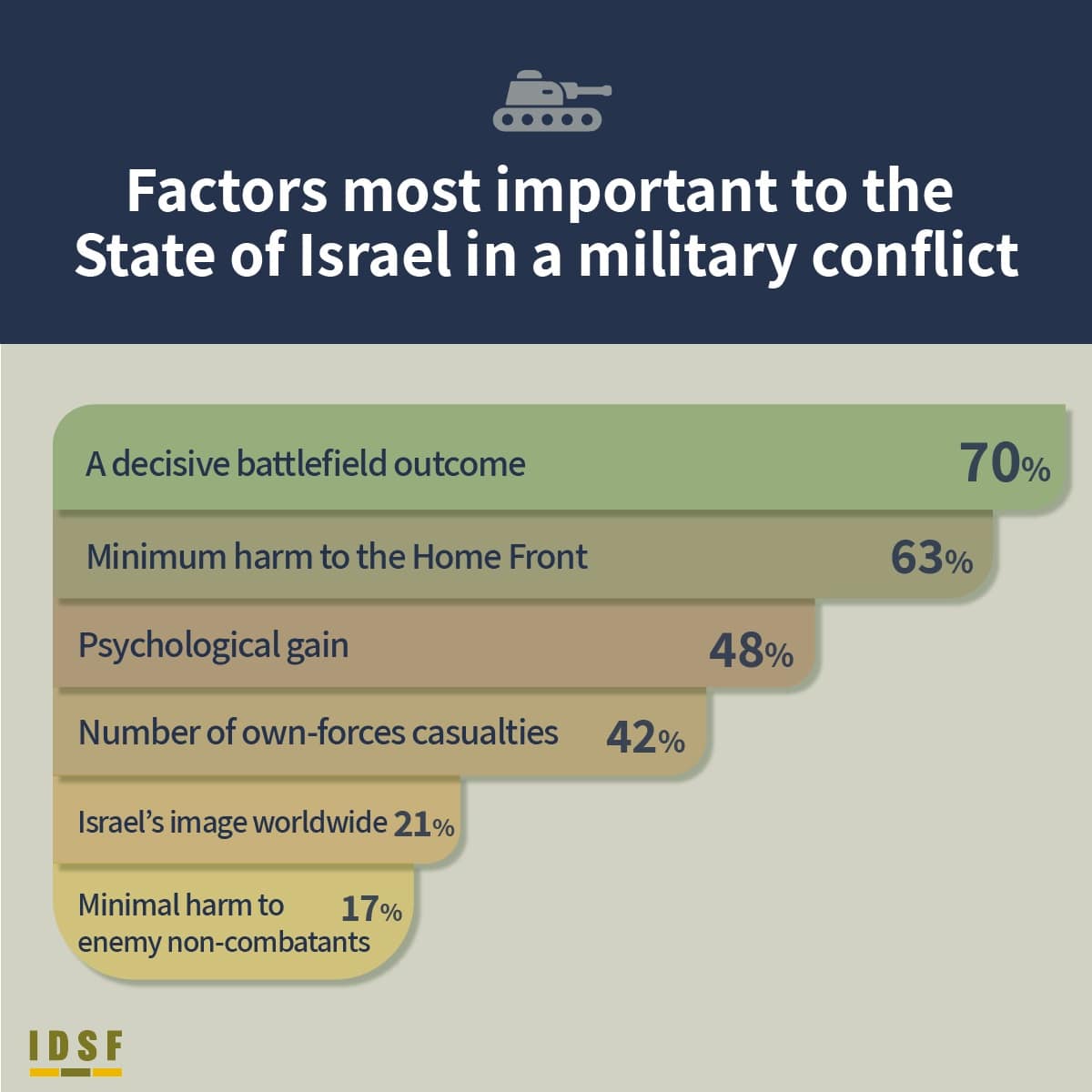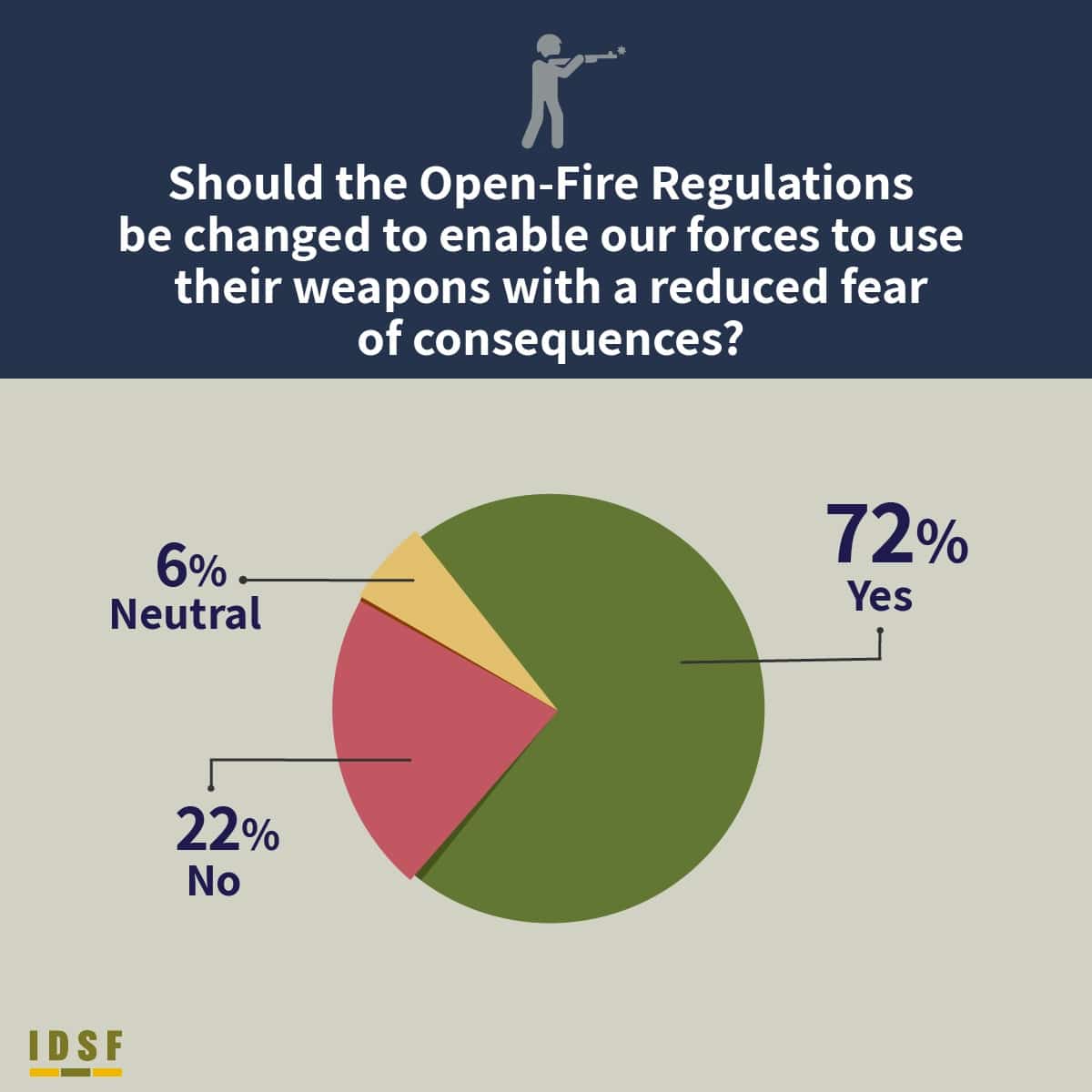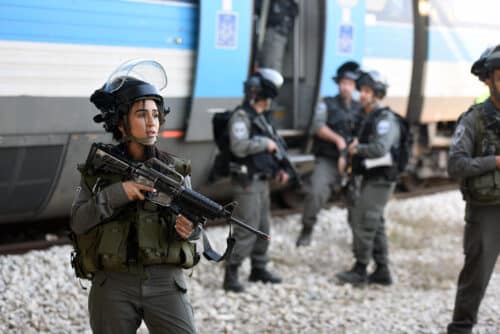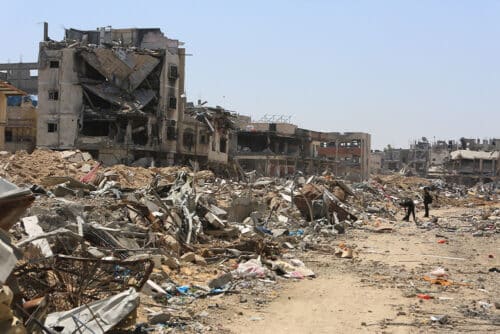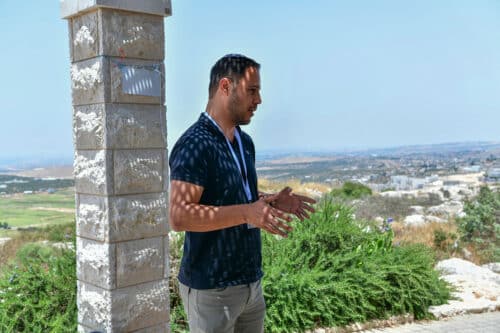Our Research Department is continuing its survey of Israeli society’s public sentiment on social issues, on Zionism and Security. The results of this ongoing survey – the “IDSF Index” – are presented to the media and the decision-makers on an ongoing basis since it is imperative that your voice be heard.
In this paper we shall summarize the first part of the IDSF Index survey, which was conduced during Q2, 2022. It dealt with the factors Israel must take into consideration during a military conflict and also with the influence the political echelons have on the military echelon.
The survey was conducted by the Research Department, with the statistical support of Dr. Haggai Elkayam. The sample was conducted among 1,232 respondents – adult Internet users in Israel. For the integrated sample (1,232 respondents) the maximum sampling margin of error is ±2.79% with a 95% probability. For the Jewish sample (1,032 respondents) the maximum sampling margin of error is ±3.05% with a 95% probability. For the Arabic survey (200 respondents) the maximum sampling margin of error is ±6.93% with a probability of 95%.
From Victory to Image: Factors in Military Combat
When conducting military battle, a variety of factors and goals come into play, sometimes conflicting with one another. These factors need to be prioritized. We began the survey by finding out which factors the Israeli public perceives as being the most important during a military conflict with a terrorist organization or with an enemy state.
The results are interesting: whereas the media and some of the policy makers voice opinions downplaying the possibility of a decisive military outcome in the battlefield while preferring a “Victory Image”, the Israeli public thinks otherwise. The factor which came out on top in the survey is – “decisive military outcome” with 70%. This is followed by minimal harm to the Israeli home-front (63%), a psychological accomplishment vis-à-vis the enemy (48%), the number of casualties among our forces (42%), safeguarding Israel’s image abroad (21%) and at the bottom of the list was minimal harm to the enemy home-front (17%).
Interestingly, there are differences in the way the Arabs and the Jews prioritized the factors. Whereas 78% of Jews believe a clear military battlefield victory is the most important factor in a military conflict, only 41% of the Arab respondents think so. Moreover, whereas only 12% of the Jewish respondents believe minimal harm to enemy non-combatants is a decisive factor to be taken into consideration during a conflict, no less than 34% of the Arab respondents believe so.
When segmenting the respondents ideologically, differences emerge within Israeli public regarding the factors perceived as being of the highest importance. Thus, for example, whereas the right believes the most important factor is achieving a decisive military outcome in the field (89%), followed by minimal harm to the Israeli home front (65%), the Israeli left had the reverse idea – minimal harm to the Israeli home front was first (72%), with a decisive military outcome in the field coming in second (58%).
One way or the other, a decisive military outcome in the field occupies a high place in the set of factors important to the overall Israeli public, far ahead of the other factors. In other words: the Israeli public wants to see a clear decisive outcome in the field when it comes to military conflict.
License to Kill: Limits and Ethics
What, actually, is a clear decisive outcome? This is an abstract concept. It is complicated to achieve, there might even be more than one way of accomplishing it and apparently the consensus is that aggressive measures have to be taken to achieve it.
One of these aggressive measures, which surfaces frequently on the public agenda, is the Open-Fire Regulations. Is the result of these regulations that our security forces are trigger-shy, or perhaps trigger-happy? In other words: should these regulations be revised such that soldiers and policemen will be less fearful of using their firearms to neutralize threats?
The survey shows that 72% of the public believes the open-fire regulations indeed should be revised. An interesting finding is that when segmenting by nationality, 81% of the Jews believe the regulations should be revised while only 35% of the Arabs think so. Furthermore, a political segmentation finds that 96% of the right-wing public, and 43% of the left-wing public believes the open-fire regulations should be revised such that soldiers and policemen will be less fearful of using live ammunition to neutralize threats.
Next we investigated an ethical issue which often comes up during military campaigns in Gaza: in case of security forces coming under fire from within a civilian target (school, hospital) – should the security forces neutralize the threat even at the cost of harming non-combatants? Despite the responses here being less unequivocal, the answer is clear: 65% of the public says yes and 26% says no (9% are neutral). Here too, the ideological divide indicates significant differences over this issue: 87% of right-wingers believe such fire must be neutralized even at the cost of harming non-combatants, whereas among the left the figure is 44%.
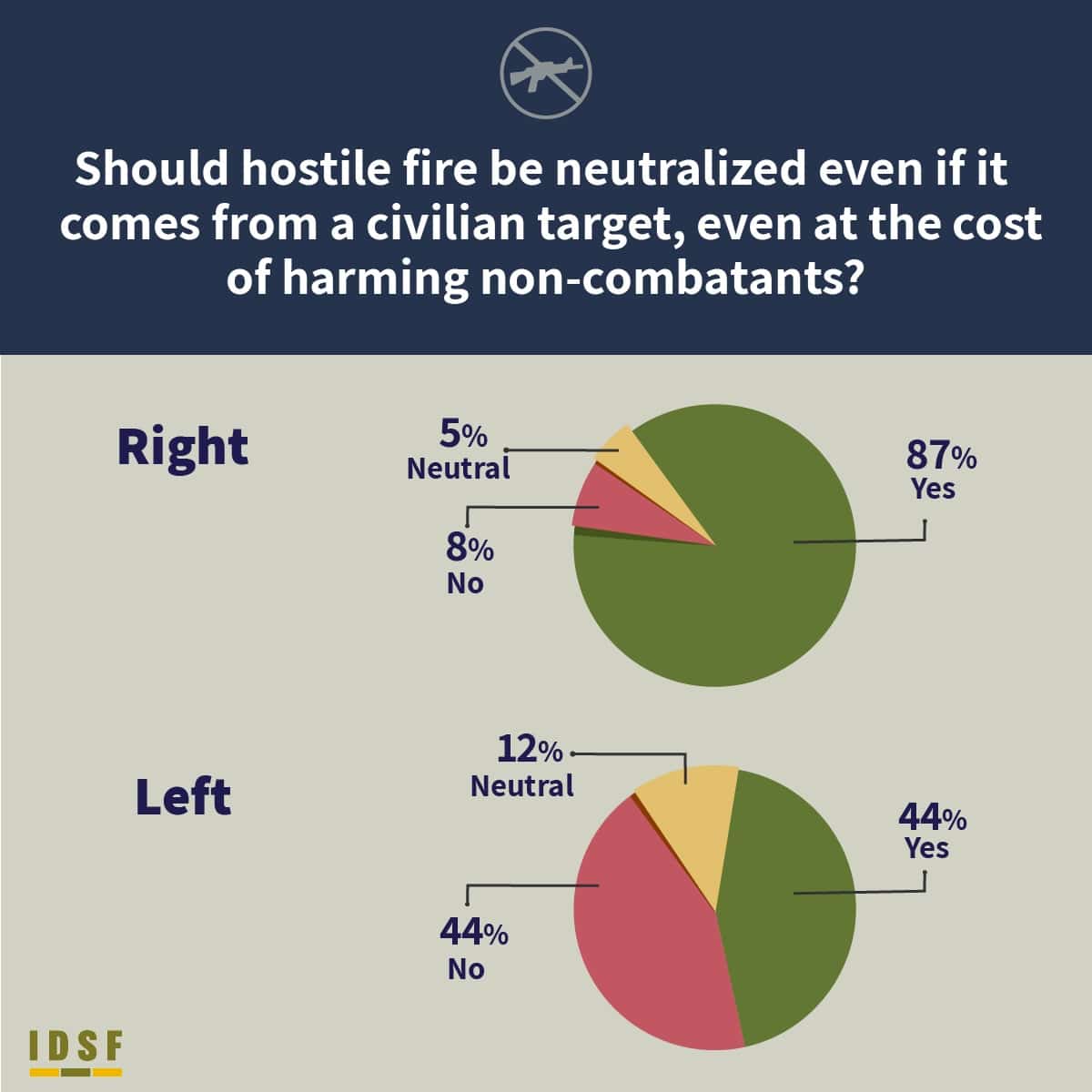
Left, Right, Left: Military perspectives through the political lens
The IDF, which is the military echelon in the State of Israel, reports directly to the political echelon. This being said, it is no secret there is a two-way relationship between them, where one influences the other. Thus for example, 14 of the 22 Chiefs of Staff became involved in politics following their discharge. Some of them were members of the security cabinet, some were Ministers of Defense and some even became Prime Ministers. This interplay between the echelons has pervaded all of Israel’s wars ever since the War of Independence. In this review we sought to find out the Israeli public’s opinion regarding the extent to which the political echelon influences the degree of the IDF’s battlefield success.
The answers show that 72% believe the political echelon is extremely influential when it comes to the IDF’s measure of battlefield success. 14% believe the influence is medium and only 9% believe it is low (5% responded “Don’t know”).
Profound differences emerge when segmenting by nationality: 78% of the Jews believe the influence is high while only 12% of the Arabs thought so. The findings go on to indicate that 13% of the Jews believe the influence is medium compared with 4% believing it is low. In contrast, 47% of the Arabs believe the influence is medium and 18% believe it is low (the rest responded “Don’t Know”).
In any case, the conclusion is clear: the vast majority of Israeli public believes the political echelon has a decisive influence on the IDF’s battlefield successes.
How much influence does an Arab party have on the security forces’ capabilities?
Last year, for the first time in Israel’s history, an Arabic party (RAAM) joined a governing coalition. You can read about the effects of RAAM’s presence in the coalition here. One way or the other, if indeed the political echelon is highly influential when it comes to the military’s battlefield success as shown in the data, it would be interesting to find out whether the presence of an Arabic party in the government or in the coalition has an impact on the security forces’ ability to achieve their goals.
51% of the Israeli public believe so, 30% believe not, and only 7% believe that an Arabic party’s presence in the government or in the coalition strengthens the security forces’ ability to achieve their goals (12% responded that they “Don’t Know”).
Ideologically, there are drastic differences between right-wing respondents and left-wing respondents. Whereas 88% on the right believe an Arabic party in the coalition has a detrimental effect on the security forces’ ability to function in a military conflict, only 12% on the left thought so. Moreover, among right-wingers, only 7% believe an Arabic party has no effect on the security forces’ capabilities and only 1% believes an Arabic party actually strengthens them. In the left-wing camp, though, 63% believe an Arabic party has no effect on the security forces’ capabilities while 13% believe such a party actually strengthens the security forces’ capabilities.
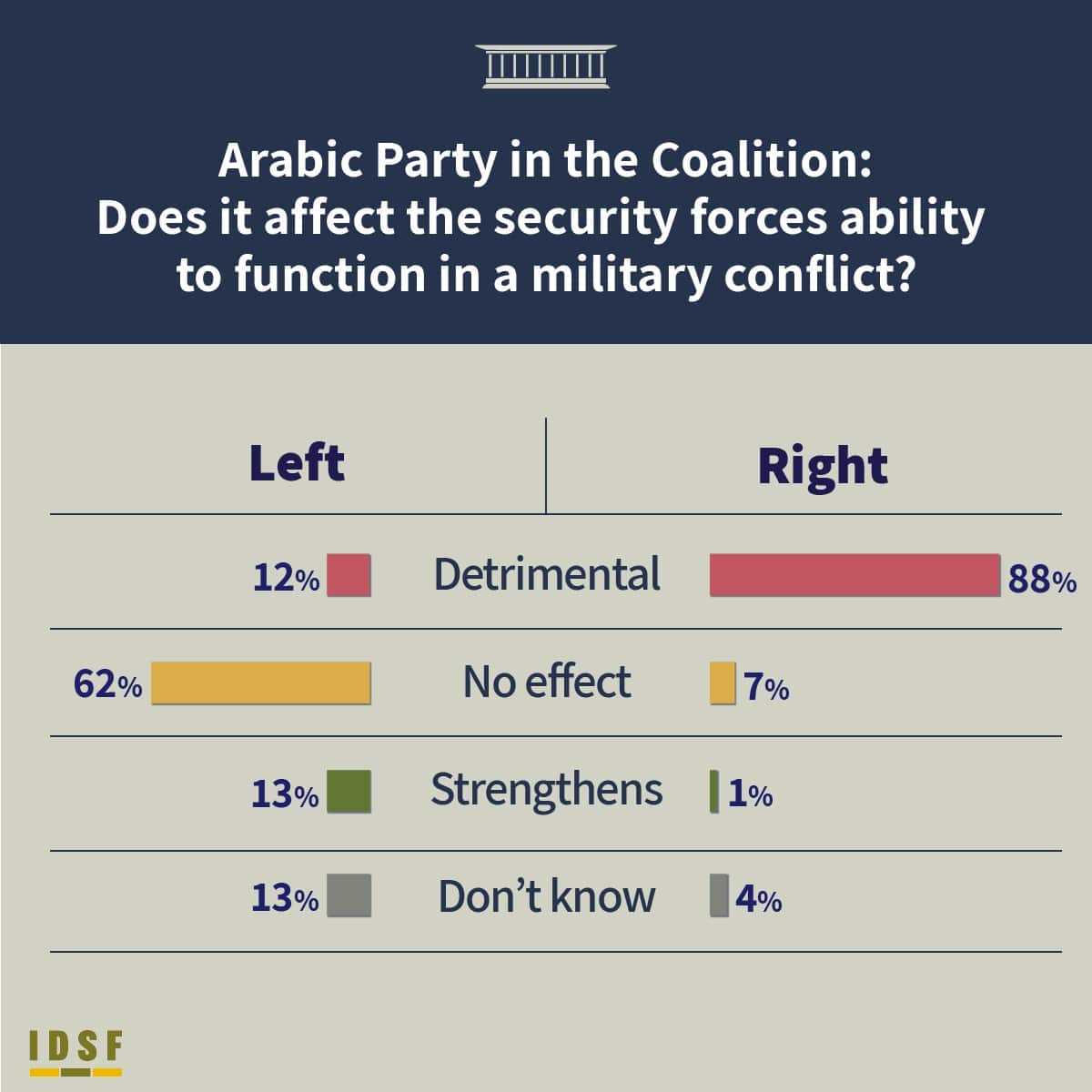
The People’s Signal to Their Leaders: In Military Conflicts, a Decisive Victory is Essential
The findings above, following analysis, clearly indicate that the Israeli public finds it important that in a military conflict, the State of Israel must emerge with a clear decisive outcome on the battlefield. The public allows the IDF the space to operate, including harming non-combatants, when fired upon from within a civilian target. Regarding the Open-Fire Regulations, too, a majority of the public is in favor of minimizing our armed forces’ hesitancy when it comes to using their firearms against threats.
The data also show that in the State of Israel, the political echelon has considerable influence over the military echelon. This being so, the identity of whoever will be piecing together the coalition must be considered and decided with the utmost care, since when push comes to shove, outside interests might be involved in the decision-making processes which are intended to protect and safeguard Israel’s security, hampering the ability of the security forces to achieve a decisive outcome.

